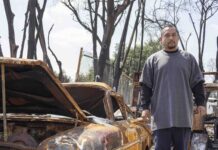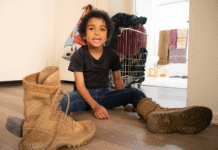Robert Hernandez was standing in front of the White Memorial Medical Center in East Los Angeles. His friend wanted to wait for the bus, but he wanted to get a taxi instead. Hernandez was smoking a cigarette with his friend when they saw a car pass by and a man lowered the window to yell out his gang’s name.
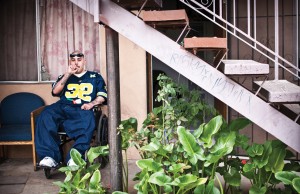
Hernandez did not hesitate to yell out his gang’s name and a few minutes after the car passed, the taxi arrived. He was opening the taxi’s door when his friend saw the car drive around the block and come back their way. His friend insisted they should run because they both knew what was next, but Hernandez refused. He wasn’t scared.
In that moment he heard the taxi’s wheel screech as the driver drove off with the door still open.
The car got closer, a man pulled out a gun and shot Hernandez. The man unloaded two more bullets, aiming for Hernandez, but instead shot a woman and her son walking down the street. The boy died.
“I tried moving to the sidewalk and telling him (my friend) to get help,” says Hernandez. “Like in that moment, I knew what was going to happen, but I was stuck. I felt stuck because I couldn’t move. All I remember is the guy going for the trigger and I fell to the ground.”
The bullet went from his left arm, and traveled to his shoulder and eventually broke his collarbone. That bullet is still there. He is paralyzed from his waist down.
That was six years ago. Now, Hernandez is 27 years old and lives with his mother, Leticia Herrera, 42, in an apartment located in the city of Montebello. He has a slim figure with fair skin, and both of his arms are entirely covered with tattoos. His head is shaved so he can show off his most recent tattoo he has across the back of his head.
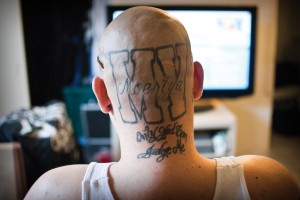
He was born in Torrance, Calif., and raised in East Los Angeles. His father left him and his mother when he was two. His father rarely visits but calls frequently.
Although he was shot and has gone through a lot of physical pain, Hernandez insists he will never change his ways simply because he doesn’t want to. But does have dreams.
“I hope to become a youth counselor someday and just tell kids my story so they won’t make the same mistake,” says Hernandez as he lies down on his hospital bed shirtless.
He admits that his “thing” before his incident occurred was to steal cars. Hernandez hopes to recover one day, but refuses to change. He will keep doing what he was doing before. He believes he will never learn because he has accepted the fact that this is the life he chose and will not change. He will not change until he is dead.
Hernandez believes his wrong doings all began at the age of 13 when he started to skip school. In 11th grade he joined a tagging crew with his friends.
He lost count how many times he has been in jail. Only two months ago he got off his probation for a high-speed pursuit from 2006. The freeway car chase went from Orange County to East Los Angeles.
“I was all methed (drugged) out when it happened,” says Hernandez, holding his touch screen phone in his right hand and using his left hand to pull up his blanket.
On the day he was shot he visited his ex-girlfriend in the hospital because she was having kidney stones removed. He decided he wanted to go home and shower. His girlfriend did not want him to leave her so she started a fight. When he left to wait for the bus with his friend he got shot.
After the shooting Hernandez spent two days in a coma. When he woke up he was not able to feel anything from the neck down. He could not even move his arms. He recalls dying three times before he fell into a coma.
“The first time I died I woke up in the ambulance, and then in the emergency room,” says Hernandez. “The third time the only thing I saw was everyone (all the doctors) on me. After that I don’t remember anything except the day I woke up but I couldn’t feel my hands or legs.”
He vaguely remembers that the first time he woke up he was being questioned by the police officers about the incident and they asked him for his name. Hernandez gave them a fictitious name, fearing he would go to jail.
After two weeks, Hernandez was able to feel his chest and arms. But, even now, he still cannot move his legs. His right hand is also paralyzed.
Hernandez has been on the street selling drugs, getting high, writing on walls, robbing places, and threatening to shoot people if they didn’t give him their money since he was 13. He admits never caring who got hurt because he needed the money for drugs and alcohol. That is all that mattered to him.
“I would rob from liquor stores and laundromats,” says Hernandez. “But my spot was on the corner of Alma Avenue and First Street in East Los Angeles. My homies and I would wait behind a wall next to a bar and just wait for people to come out so I can steal their money.”
He did not aim for a certain type of victim because he didn’t care who it was. He isn’t even sure if the victims he has shot are alive or dead. As soon as he got what he wanted he would walk away without a care. Hernandez believes that if he would have had a stable home, a loving father who never left him, and his mother, he might have never gone down this path.
Hernandez had three jobs before he got shot. His first job was at a car dealership. His second job was at a liquor store and his most recent job was at a tattoo parlor located in East Los Angeles. Besides robbing people, his hobby was tattooing.
He lives with no regrets, and admits that if he can go back in time he would do it all over again. He knew the things he was doing before the incident happened were bad but he enjoyed the rush it gave him and he loved the feeling of almost getting caught. He’s not interested in changing who he is because he likes who he is and will never change.
“My dad lives in Vegas and he wants me to go live with him, but I can’t leave my mom,” says Hernandez. “She’s been my mom and dad all my life. I would tell her all the time when I was in jail that I would change but I would do the same thing again.”
His mother is a diligent woman who works part-time as a waitress at IHOP in downtown Los Angeles. She has three children, all from different fathers, and currently lives with her kids and her boyfriend. She is the one who takes care of Hernandez’s needs.
“It hurts to see my son like this,” says Herrera. “He wants to get an operation because the doctor tells him it might make him walk again but I’m not sure. We don’t know how much it will cost us but I’m sure it’s not cheap. I don’t want to get his hopes up.”
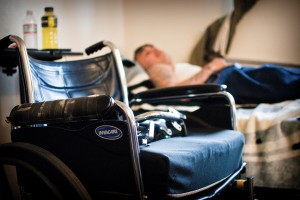
Hernandez lives in a three-bedroom apartment in Montebello with his mother, his 22-year-old sister, and his 14-year-old brother. His room is small and dark with the only window next to his bed shut. He has a 22-inch flat screen TV and a play station game is usually on. Behind it he has a big closet filled with clothes and boxes. The only thing hanging from his wall is a cross with small handwritten prayers tucked behind it.
His body is covered with tattoos representing his friends who have been killed. Hernandez also has his gang’s name tattooed on his right arm. He does not know how many tattoos he has but he believes it is more than 35. He wants to get more done because he feels like tattoos ease the pain.
Later, his mother comes to tell him that his friend Carlos Rodriguez, 19, is here to visit him. His face lights up.
“Through everything I’ve been through you also see who my true friends are,” says Hernandez. “I got a friend who called me to see how I was and never called again, but this guy has been a good one.”
Hernandez gives his friend a handshake followed by them bumping their knuckles together. Rodriguez takes a seat on the velour couch in the room.
“He’s been a good friend to me too and he’s done a lot for me so I can’t let my friend be alone in this,” says Rodriguez.
Hernandez confessed that he is not only suffering emotionally, but he has physical pain as well. He is not able to move his legs but he suffers from pressure sores, also known as bedsores. These sores come about when you stay in a certain position for too long, and he gets them all around his body.
Taking his iPhone with his right hand and going through his gallery he pulls up a picture he had taken of himself having a pressure sore on his left rib cage. It is a bloody deep hole in his skin. Whenever he gets them a nurse comes, checks it, and prescribes something for the pain.
“I cry at times,” says Hernandez. “It helps, but I wake up the next day and find everything is the same. I never think of the future. I take it day by day.”

